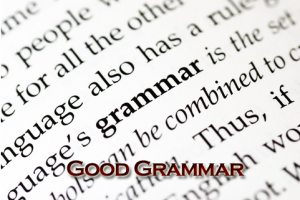Like speaking badly, poor grammar is guaranteed to lose you marks in the IELTS Test.
Grammatical errors are to be expected when you write or speak English but there are some mistakes which are really basic and should be avoided if you don’t want want to get low IELTS band scores.
This is the first of a series of Good Grammar posts from Pass IELTS Higher.
Here are five Grammar Mistakes you should take care to avoid at IELTS Band Score 7+:
Your vs. You’re
This one really grates with me, and it has become extremely common on the internet in Facebook and Twitter. To avoid this error just stop using contractions in your writing.
“Your” is a possessive pronoun, as in “your car” or “your pen.” “You’re” is a contraction for “you are,” as in “you’re messing up your writing by using your when you really mean you are.” If you stop using contractions you won’t make this mistake.
It’s vs. Its
This is another very common mistake which is very easily avoided by thinking through what you’re trying to say.
“It’s” is a contraction of “it is” or “it has.” “Its” is a possessive pronoun, as in “this car has lost its wheel.” Here’s an easy way to remember which to use. Say your sentence out loud using “it is” instead. If the sentence sounds wrong, “its” is probably the correct choice.
There vs. Their vs. They’re
These homophones often cause difficulty but they are easy to use once you learn them.
The easiest to remember is “They’re” because it is a contraction. The advice to IELTS students is never to use contractions in written work so this shouldn’t be a problem during the test.
“Their” is a plural possessive pronoun, as in “their belongings” or “their opinions.” Ask yourself if you are talking about more than one person and something that they possess? If so, “their” is usually correct.
“There” is used many ways, including as a reference to a place or position, e.g. “over there”, “there is a cat on the roof” or as a pronoun, e.g. there is a wonderful view from the hill”, “there is no hope”.
Affect vs. Effect
This is one where I have to take care to make sure I use it correctly. As with any of the confusing words, it’s taking that moment to get it right that makes the difference in your writing.
Affect is a verb, although very rarely it can be used as a noun. Effect can be a verb or a noun, so it’s no wonder most people get in a muddle here.
Effect (noun): a thing that has happened, e.g. “scoring the winning goal had an effect on Toby”
Effect (verb): to bring about change, e.g. “The council will effect changes to the city centre parking restrictions from next year.”
Affect (verb): to produce an effect on, e.g. “Elizabeth having a scar on her face didn’t affect the way Thomas felt about her.”
To vs. Too vs. Two
To is a preposition, meaning that it’s used with a noun or pronoun. Most people use it all the time, e.g. “The couples danced to the music”.
Too has a number of meanings:
“As well” e.g. “Juliet wanted to go on holiday too, all her friends had been already.”
“In excess” e.g. “The Chef had added too much flour to the cake mixture.”
“More (of something) than ideal” e.g. “The heat from the fire was too hot so Richard moved back.”
Two is the written form of the number, 2.
There are more grammar traps like these for the unwary student of English. I’ll be writing about more of them in future posts. Spend a while practising those I’ve expanded upon as you prepare for your IELTS Test. Your IELTS Band Score will be better for the exercise.
To your IELTS success,
James
P.S. These and other lessons in english grammar can be found in both Grammar Girl’s Quick and Dirty Tips for Better Writing and English Grammar In Use with Answers and CD ROM: A Self-study Reference and Practice Book for Intermediate Students of English.
P.P.S.We will be publishing a Good Grammar post often. Please look out for it.Comment below to let me know of any confusing grammar, or any other English grammar, that you would like explaining on this website.


Leave a Reply